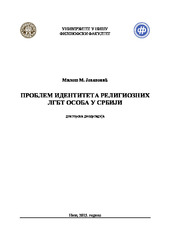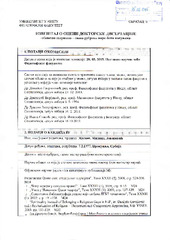Приказ основних података о дисертацији
Problem identiteta religioznih LGBT osoba u Srbiji
| dc.contributor.advisor | Gavrilović, Danijela | |
| dc.contributor.other | Spasić, Ivana | |
| dc.contributor.other | Đorđević, Dragoljub | |
| dc.contributor.other | Stjepanović Zaharijevski, Dragana | |
| dc.creator | Jovanović, Miloš M. | |
| dc.date.accessioned | 2016-04-10T11:45:44Z | |
| dc.date.available | 2016-04-10T11:45:44Z | |
| dc.date.available | 2020-07-03T16:18:31Z | |
| dc.date.issued | 2015-10-07 | |
| dc.identifier.uri | https://nardus.mpn.gov.rs/handle/123456789/5124 | |
| dc.identifier.uri | http://eteze.ni.ac.rs/application/showtheses?thesesId=2715 | |
| dc.identifier.uri | https://fedorani.ni.ac.rs/fedora/get/o:1045/bdef:Content/download | |
| dc.identifier.uri | http://vbs.rs/scripts/cobiss?command=DISPLAY&base=70052&RID=1545150719 | |
| dc.description.abstract | The topic of this thesis is the problem of the construction of identity of religious LGBT people in Serbia at the beginning of the 21st century. The thesis consists of three parts: 1. Designing the theory that would serve as a framework for examining the processes of identity formation, 2. Determining the locus that non-heterosexuality and religion occupy in the contemporary Serbian society (description of the mise-en-scène in which the actors shape their identities), and 3. Verifying the theoretical construct on empirical material. At the beginning of the first part, the thesis attempts to clarify the concept of identity. This is followed by an overview of the sociological considerations of identity which are relevant for the topic of the thesis. A critical analysis of the conceptualization of identities as “necessary fictions” concludes the first part of the thesis. Symbolic interactionism, phenomenological sociology, and social constructionism appear as the richest as well as the most useful conceptual resources for the “assembly” of the interpretive framework for deliberating the notion of identity. The works of Anthony Giddens are consulted in the consideration of the functioning of identity in the late modern society, while the political dimension of identities is perceived through Jeffrey Weeks’ vision of “radical pluralism”. The social context, that comprises the structural frame in which the construction of identity of non-heterosexual believers takes place, is delineated in the second part of the thesis. The position of homosexuality in the Serbian society and the predominant attitude towards homosexuality in the religious field are determined. Firstly, the ways in which homosexuality was understood (and thus shaped) within the medical discourse during the second half of the 20th and at the beginning of the 21st century are described. This is followed by an overview of the existing survey findings of attitudes on homosexuals/homosexuality in Serbia and by a historical synopsis of the legal treatment of the same-sex behavior, beginning with the medieval sources and concluding with the present day legal acts. What follows is the review of the attitudes of religious officials toward nonheterosexuality, which have been brought forth regularly at every announcement or holding of the gay parade in the capital. The data from several social surveys provide an insight into the relation between the level of religiosity and the type of attitude toward the same-sex inclined part of the population. The third part of the thesis begins with the examination of the existing theoretical discussions and empirical investigations of the identity of religious non-heterosexuals, with an attempt to establish typical “maneuvers” performed in the construction of identity. The attention is, then, focused on “spirituality”, a concept which plays the central role in the analysis of the aforementioned processes. After providing an insight into the methodological procedure used to gather the empirical material, the third part ends with using the outlined types to consider the interaction of religious and sexual identity – their shaping through negotiation, in opposition to the concomitant resistance. The thesis finally analyzes the ways of shaping religiosity and its functioning within members of a stigmatized and marginalized social group – the experience of LGBT persons and their positioning as “religious queers” in the intersection of the spheres which the dominant culture sets as conflicting and exclusive. The emphasis in the analysis is placed on the role of the narratives in constructing the identity of the members of this population, as well as on the strategies of the conception, validation and enactment of the coherent identity. | en |
| dc.format | application/pdf | |
| dc.language | sr | |
| dc.publisher | Универзитет у Нишу, Филозофски факултет | sr |
| dc.relation | info:eu-repo/grantAgreement/MESTD/Basic Research (BR or ON)/179074/RS// | |
| dc.rights | openAccess | en |
| dc.rights.uri | https://creativecommons.org/licenses/by-nc-nd/4.0/ | |
| dc.source | Универзитет у Нишу | sr |
| dc.subject | identitet | sr |
| dc.subject | Identity | en |
| dc.subject | neheteroseksualci | sr |
| dc.subject | religija | sr |
| dc.subject | homoseksualnost | sr |
| dc.subject | spiritualnost | sr |
| dc.subject | savremena Srbija | sr |
| dc.subject | Non-heterosexuals | en |
| dc.subject | Religion | en |
| dc.subject | Homosexuality | en |
| dc.subject | Spirituality | en |
| dc.subject | Contemporary Serbia | en |
| dc.title | Problem identiteta religioznih LGBT osoba u Srbiji | sr |
| dc.type | doctoralThesis | en |
| dc.rights.license | BY-NC-ND | |
| dcterms.abstract | Гавриловић, Данијела; Спасић, Ивана; Ђорђевић, Драгољуб; Стјепановић Захаријевски, Драгана; Јовановић, Милош М.; Проблем идентитета религиозних ЛГБТ особа у Србији; Проблем идентитета религиозних ЛГБТ особа у Србији; | |
| dc.identifier.fulltext | https://nardus.mpn.gov.rs/bitstream/id/55486/Jovanovic_Milos_M.pdf | |
| dc.identifier.fulltext | http://nardus.mpn.gov.rs/bitstream/id/55486/Jovanovic_Milos_M.pdf | |
| dc.identifier.fulltext | http://nardus.mpn.gov.rs/bitstream/id/55485/Dis_UNI_Milos_M_Jovanovic_2015.pdf | |
| dc.identifier.fulltext | https://nardus.mpn.gov.rs/bitstream/id/55485/Dis_UNI_Milos_M_Jovanovic_2015.pdf | |
| dc.identifier.rcub | https://hdl.handle.net/21.15107/rcub_nardus_5124 |



